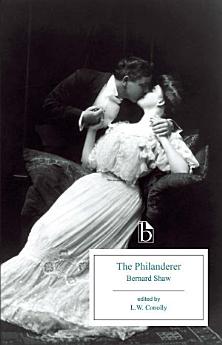The Philanderer
মে’ ২০১৫ · Broadview Press
ইবুক
208
পৃষ্ঠা
family_home
যোগ্য
info
reportমূল্যাংকন আৰু পৰ্যালোচনা সত্যাপন কৰা হোৱা নাই অধিক জানক
এই ইবুকখনৰ বিষয়ে
The second of Shaw’s “unpleasant” plays, written in 1893, published in 1898, but not performed until 1905, The Philanderer is subtitled “A Topical Comedy.” The eclectic range of topical subjects addressed in the play includes the influence of Norwegian playwright Henrik Ibsen on British middle-class social mores (the second act of The Philanderer is set in the fictional Ibsen Club), medical follies, the rise of the “New Woman,” and, in particular, the destructive impact of Victorian marriage and divorce laws. Just as Shaw’s other “unpleasant” plays, Widowers’ Houses and Mrs Warren’s Profession, call, respectively, for reform of laws that allow corrupt property owners to exploit the poor and for radical change to economic structures that drive women into prostitution, so The Philanderer makes the case for more liberal legislation to allow easier divorce—particularly for women—when marriages become irretrievably broken.
Shaw’s attack on divorce laws becomes even clearer and stronger in the final act that he wrote for the play but discarded in favour of the version he published. The discarded version is published for the first time in this Broadview edition of the play.
লিখকৰ বিষয়ে
L.W. Conolly is Emeritus Professor of English at Trent University; an Honorary Fellow, Robinson College, Cambridge University; a Senior Fellow, Massey College, University of Toronto; and a Fellow of the Royal Society of Canada. He is the editor of the Broadview Edition of Bernard Shaw’s Mrs Warren’s Profession (2005) and the author of many other books on Shaw.
এই ইবুকখনক মূল্যাংকন কৰক
আমাক আপোনাৰ মতামত জনাওক।
পঢ়াৰ নির্দেশাৱলী
স্মাৰ্টফ’ন আৰু টেবলেট
Android আৰু iPad/iPhoneৰ বাবে Google Play Books এপটো ইনষ্টল কৰক। ই স্বয়ংক্রিয়ভাৱে আপোনাৰ একাউণ্টৰ সৈতে ছিংক হয় আৰু আপুনি য'তে নাথাকক ত'তেই কোনো অডিঅ'বুক অনলাইন বা অফলাইনত শুনিবলৈ সুবিধা দিয়ে।
লেপটপ আৰু কম্পিউটাৰ
আপুনি কম্পিউটাৰৰ ৱেব ব্রাউজাৰ ব্যৱহাৰ কৰি Google Playত কিনা অডিঅ'বুকসমূহ শুনিব পাৰে।
ই-ৰীডাৰ আৰু অন্য ডিভাইচ
Kobo eReadersৰ দৰে ই-চিয়াঁহীৰ ডিভাইচসমূহত পঢ়িবলৈ, আপুনি এটা ফাইল ডাউনল’ড কৰি সেইটো আপোনাৰ ডিভাইচলৈ স্থানান্তৰণ কৰিব লাগিব। সমৰ্থিত ই-ৰিডাৰলৈ ফাইলটো কেনেকৈ স্থানান্তৰ কৰিব জানিবলৈ সহায় কেন্দ্ৰত থকা সবিশেষ নিৰ্দেশাৱলী চাওক।








